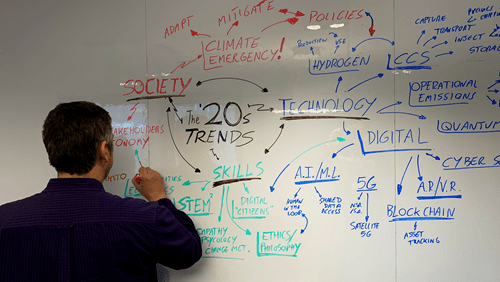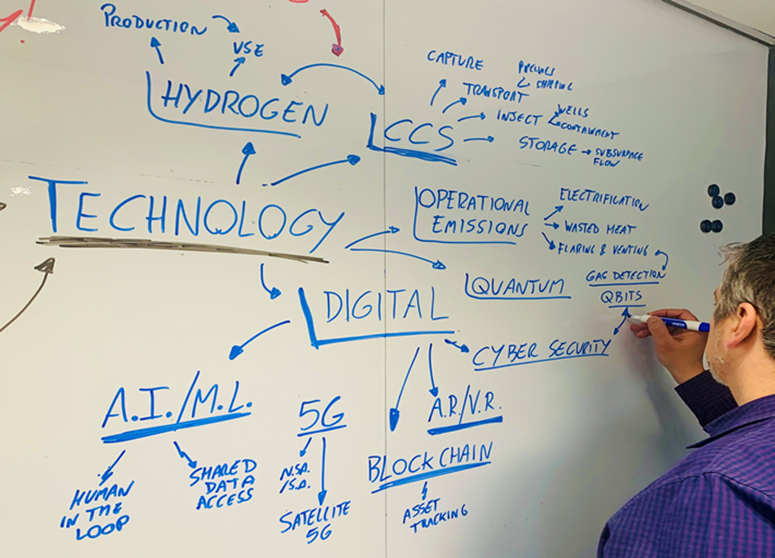NEWS & INSIGHTS | Opinion
Trends and technologies to watch in 2020

The start of a new year, and of a new decade, sounds like the perfect timing for a check on the status of technology innovation and its direction, and scan the horizon for the key trends that will likely make an impact in the rest of the year.
The climate emergency marked the end of the 10s and the 20s will be the make or break decade. The question is no longer how to avoid the effect of climate change, but how to mitigate, adapt and recover. Decarbonisation is going to be the main topic on the world agenda in 2020 and November’s COP26 in Glasgow will be crucially important. The challenge is agreeing in policies to rapidly achieve net zero while meeting the energy needs of developing countries and provide clean and affordable energy for all.
The second macro trend likely to dominate the 20s is a rethinking of the market economy. The CEOs of America’s largest companies, combining more than $7 trillion revenues, said in August last year that their companies must commit to all stakeholders, including communities and the environment, with shareholders coming last in the list. The World Economic Forum is about to discuss a new Manifesto for Stakeholder Capitalism, articulating a set of ethical principles to tackle today’s social and environmental challenges. This can change the way we look at the costs of tackling climate change.

For these reasons and more, we will likely see an acceleration of testing and deployment of technologies for Net Zero, with integration across energy segments, particularly oil/gas and offshore renewables, building on each others strength. Decarbonising offshore operational emissions will be a key focus in 2020 for the oil and gas industry, moving from concept to deployment of electrification solutions, waste heat recovery and other technologies. There will be pilot projects in 2020 which will break down silos and develop the integrated energy solutions we need to move towards the target of a net zero North Sea basin.
Hydrogen and CCS (Carbon Capture and Storage) will also be on the front line. Keele University has started blending Hydrogen with natural gas in their network, and we’ll hopefully see progress on the various Hydrogen and CCS projects to decarbonise heating, industrial clusters and heavy transport.
Hopefully we will also see some new technologies to reutilise carbon in ways that keep it out of the atmosphere for long time, or even permanently, for example in new materials or in construction. That won’t reduce the need for CCS at least in the mid-term but could instead provide a boost to the direct air capture technologies currently being developed and tested.
Policies will be key to create a commercial framework and therefore a market for CCS, likely with a combination of RAB (Regulatory Asset Base) and CfD (Contracts for Difference) systems – and possibly some actions on carbon prices and emissions trading schemes. Government has a key role to play also in supporting the innovation required to reduce the costs and increase reliability of decarbonisation technology and enable faster and wider deployment, be it via red tape removal, subsidies and incentives or direct investment. The CCC (Committee on Climate Change) will publish its recommendation for the Sixth Carbon Budget in the summer, and later in the year COP26 – in Glasgow – will mark a key checkpoint on both UK and global policies ability to enable a Just Energy Transition and address green house gas emissions from all sectors of society.

The technology buzzwords of the last decade were all about digital. That is not going to change in the 20s and digital technologies will become so normal to the point of being invisible.
AI is already all around us, mostly augmenting humans workers’ capabilities rather than replacing them. While that has mainly affected the consumer world so far, from music recommendations to dynamic travel pricing, 2020 will see more applications in industrial processes, from maintenance and inspection to integrated activities planning.
Trust and security will be critical factors. The rise of deep fakes and troll bots is a big concern in the wider society world, and industrial adoption requires trust in the machine making safe and sound decisions. So it’s likely we’ll see AI and machine learning used to augment the human in the loop with recommendations rather than automated decision, at least in the first part of the decade.
Cybersecurity is already critical and in 2019 saw some serious cases of both commercial breach and state driven cyberwarfare. As we move towards the internet of everything and unmanned remote operations, the race is on between technologies to attack and defend digital and physical assets, and we can expect a lot of activity on the security front.
Blockchain continues to promise to be the most disruptive technology, just as it did last year, and the year before, and since bitcoin became a bubble. Adoption in industrial context has proven so far slower than most expected. We can expect some pilots in 2020 probably focused on assets or people tracking, and their success will determine the rate of adoption for the rest of the decade.
Augmented and virtual reality is another technology that went through various cycles of hype and reality check. While it’s now in many museums and tourist attractions as an “experience” it hasn’t become mainstream in gaming as expected and is still mainly at demo stage in Industry. Last year at the OGTC we saw some promising application in augmenting offshore workers with maintenance hands-free instructions, so this could be the year when this technology comes of age with new, lighter and more easily wearable devices.
Quantum engineering has seen some interesting progress last year, and research into it getting a lot of attention and investment from government. Quantum technology is being developed for various uses, from cybersecurity to gas detection. IBM and Google launched their quantum computers towards the end of last year and are in a race along new players to demonstrate “quantum supremacy”, performing tasks beyond the reach of even the most powerful conventional supercomputer. Given the need to cool the Q-bits close to the absolute zero, we won’t see Quantum personal computers any time soon, but the quantum supremacy could offer dramatic acceleration in specific huge data fields like earth and climate modelling, allowing both better weather prediction and super complex simulations to support the fight to climate change.
5G is being deployed in various cities and will likely see more than 100 million devices connected by the end of the year. This year rollout of 5G networks are non stand-alone, providing higher data-bandwidth and more reliable connectivity. But the real game changing use cases based on ultra-low latency and much higher capacity will only be feasible with the 5G stand Alone network architecture later on in the decade.
The energy industry will benefit from the race towards connected vehicles which is driving the UK Space Agency’s Darwin Programme to test seamless highspeed data connections using 5G and satellites to ensure that vehicles stay connected outside of towns and cities. That offers the potential for a different level of connectivity to offshore installations. Combine that with quantum computers accessed via a 5G enable cloud and the possibility for a digital and automation revolution within the decade become possible, and very interesting.

Much has been said about the impact of technology, particularly digital, to jobs and employment, with opinions ranging from the darkest pessimism of the robot taking over to the uber optimist of a stress-free society for all. While the public debate is on jobs, the focus should instead be on skills: technology will change how we do our jobs more than replacing them altogether, and the new challenges requires different approaches and skills.
The transition to net zero society will require more chemical and process engineers and STEM (Science, Technology, Engineering and Maths) skills will be even more in demand. From transforming farming and agriculture to lower impact on soil and atmosphere, to develop hydrogen and CCUS solutions, new batteries and energy storage systems, new and more sustainable materials, etc.
All jobs need to deal with digital, be it disruption or enhancement, and digital education is already becoming a key area of business for universities in the country and globally. It’s not so much about creating armies of data scientists but rather educating workers to be digital citizens, able to perform and adapt their jobs in a more digitally enabled environment.
Finance rules the world of business and will keep doing so, but the shift from maximising shareholders returns towards a stakeholders economy may change the paradigm bringing the environmental externalities in the balance sheet and advanced economics is likely to be a critical skill for companies embracing the shift.
Finally, while technology innovation is a key enabler for the sustainable future we need, to make it happen and to steer in the right direction we can’t forget the humans who need to embrace and adopt it, and neither the risk of deviations or misuses. Social skills like empathy, emotional intelligence, psychology are key to manage the change and deal with the human side of the technology revolution; and ethics and philosophy have a key role to play in influencing the direction and the application of artificial intelligence and machine learning, and deal with the unintended consequences of their rapid development.

Many other factors are also at play to influence the direction of society and technology, and it will be interesting to see at the end of the year how much of the above materialise, and what new and unexpected developments unfold. The escalation of tension between US an Iran in the first week of the year provides a reminder that of geopolitics is, as always, the black swan that can change everything, and generate hard to predict developments that could change both the energy global landscape and world priorities altogether.
What is certain is at the OGTC we look forward to collaborating with our partners in business, government and academia on transforming the Industry for the future. Over the next months, we are going to explore many of the trends and technologies described above and uncover with our partners what they mean for the oil and gas industry. Watch this space and please let us know your thoughts and ideas!
Subscribe for the latest updates
